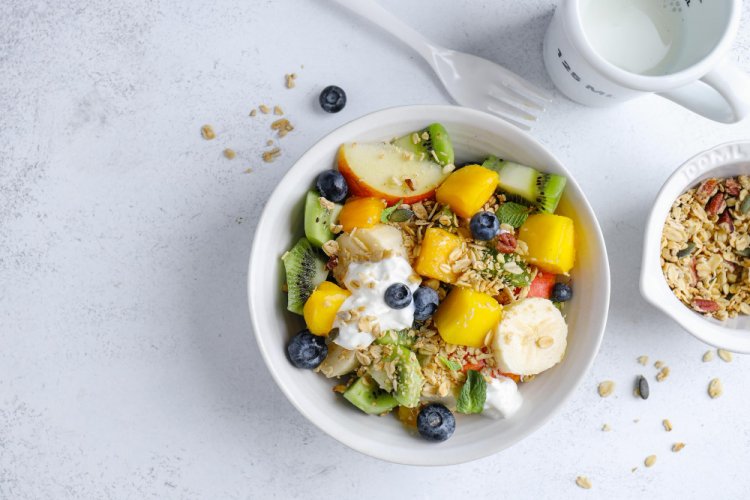The Top 10 Foods for Optimal Digestion
Digestive health is a cornerstone of overall well-being, and the foods we consume play a pivotal role in ensuring our digestive system functions optimally. By incorporating specific foods into our diet, we can alleviate digestive discomfort, prevent common issues like constipation or diarrhea, and enhance nutrient absorption. Let's delve deeper into the top 10 foods renowned for their digestive benefits:

Yogurt:
Yogurt is a powerhouse of nutrients, boasting high levels of protein, calcium, B vitamins, and probiotics. Probiotics, often referred to as "good bacteria," are live microorganisms that confer health benefits when consumed in adequate amounts. These beneficial bacteria aid in maintaining the balance of gut flora, which is crucial for optimal digestion and immune function. Opt for plain, unsweetened yogurt with live active cultures to maximize probiotic content.
Bananas:
Bananas are not only delicious but also incredibly nutritious, making them a go-to fruit for digestive health. They are rich in dietary fiber, particularly soluble fiber, which absorbs water and adds bulk to stool. Additionally, bananas contain pectin, a type of soluble fiber that aids digestion by promoting regular bowel movements and preventing constipation.
Ginger:
Ginger has been revered for centuries for its medicinal properties, particularly its ability to alleviate digestive discomfort. The active compounds in ginger, such as gingerol and shogaol, possess anti-inflammatory and anti-nausea properties, making it effective in soothing an upset stomach and relieving indigestion. Ginger also stimulates saliva production, which kickstarts the digestive process by breaking down food particles.
Whole Grains:
Whole grains encompass a wide variety of grains, including oats, quinoa, brown rice, barley, and whole wheat. Unlike refined grains, whole grains retain their bran and germ layers, which are rich in fiber, vitamins, minerals, and antioxidants. Fiber, both soluble and insoluble, plays a pivotal role in digestive health by promoting regular bowel movements, preventing constipation, and reducing the risk of gastrointestinal disorders like diverticulosis. Moreover, whole grains provide sustained energy and contribute to overall satiety, aiding in weight management.
Leafy Greens:
Leafy greens, such as spinach, kale, Swiss chard, and collard greens, are nutritional powerhouses packed with vitamins, minerals, antioxidants, and fiber. Fiber, in particular, supports digestive health by adding bulk to stool, facilitating bowel movements, and nourishing beneficial gut bacteria. Additionally, leafy greens contain chlorophyll, a green pigment with detoxifying properties that promote a healthy gastrointestinal tract.
Fermented Foods:
Fermented foods have surged in popularity due to their numerous health benefits, particularly their positive effects on gut health. Examples of fermented foods include sauerkraut, kimchi, kefir, yogurt, miso, tempeh, and kombucha. During the fermentation process, beneficial bacteria, such as Lactobacillus and Bifidobacterium strains, proliferate, transforming sugars and carbohydrates into lactic acid and other compounds. These probiotic-rich foods help restore and maintain a healthy balance of gut microbiota, thereby enhancing digestion, nutrient absorption, and immune function.
Lean Protein:
Protein is an essential macronutrient involved in various physiological processes, including tissue repair, muscle synthesis, and enzyme production. However, not all protein sources are created equal when it comes to digestive health. Lean protein sources, such as poultry (chicken, turkey), fish (salmon, tuna), tofu, tempeh, and legumes (beans, lentils), are easier to digest than fatty or heavily processed meats. Incorporating lean protein into your diet provides essential amino acids while minimizing the burden on the digestive system.
Apples:
The adage "an apple a day keeps the doctor away" holds merit, especially concerning digestive health. Apples are rich in dietary fiber, particularly pectin, a soluble fiber that acts as a prebiotic, nourishing beneficial gut bacteria. Pectin also forms a gel-like substance in the intestines, promoting regular bowel movements and preventing diarrhea. Moreover, apples contain antioxidants like quercetin, which possess anti-inflammatory properties and support overall gut health.
Bone Broth:
Bone broth has garnered attention in recent years for its myriad health benefits, particularly its role in promoting gut health. Made by simmering animal bones (typically chicken, beef, or fish) with water and aromatic vegetables for an extended period, bone broth is rich in collagen, gelatin, amino acids, and minerals. These nutrients support the integrity of the intestinal lining, reduce inflammation, and promote the healing of digestive ailments like leaky gut syndrome. Additionally, the gelatin in bone broth helps soothe and protect the digestive tract, making it an excellent option for individuals with sensitive stomachs.
Chia Seeds:
Chia seeds have emerged as a nutritional powerhouse, revered for their impressive nutrient profile and versatile culinary applications. These tiny seeds are rich in soluble fiber, omega-3 fatty acids, protein, antioxidants, vitamins, and minerals. When exposed to liquids, chia seeds form a gel-like substance due to their high soluble fiber content. This gel aids digestion by slowing down the emptying of the stomach, promoting satiety, regulating blood sugar levels, and facilitating the passage of food through the digestive tract. Furthermore, the omega-3 fatty acids in chia seeds possess anti-inflammatory properties, benefiting overall gut health and reducing the risk of digestive disorders.
By incorporating these nutrient-dense foods into your diet, you can optimize digestive health, support beneficial gut bacteria, and mitigate digestive discomfort. Remember to prioritize whole, unprocessed foods, stay adequately hydrated, engage in regular physical activity, manage stress levels, and listen to your body's cues for optimal digestive function.
#DigestiveHealth #OptimalDigestion #GutHealth #HealthyEating #NutritionTips #Probiotics #FiberRichFoods #WholeGrains #LeafyGreens #LeanProtein #FermentedFoods #ApplesForHealth #BoneBrothBenefits #ChiaSeedsNutrition #WellnessJourney
Disclaimer:
The information provided in this article is for educational purposes only and should not be considered medical advice. If you have any health concerns or are experiencing symptoms, it is important to consult with a healthcare professional, such as a doctor or clinic, for proper diagnosis and treatment. Always seek the advice of your doctor or other qualified health provider with any questions you may have regarding a medical condition. Do not disregard professional medical advice or delay in seeking it because of something you have read in this article.
What's Your Reaction?





















